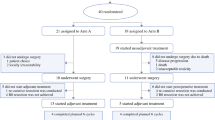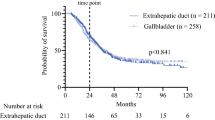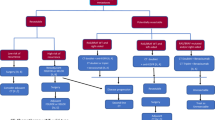Abstract
Background
Recurrence patterns in stage III colon cancer (CC) patients according to molecular markers remain unclear. The objective of the study was to assess recurrence patterns according to microsatellite instability (MSI), RAS and BRAFV600E status in stage III CC patients.
Methods
All stage III CC patients from the PETACC-8 randomized trial tested for MSI, RAS and BRAFV600E status were included. The site and characteristics of recurrence were analyzed according to molecular status. Survival after recurrence (SAR) was analyzed.
Results
A total of 1650 patients were included. Recurrence occurred in 434 patients (26.3%). Microsatellite stable (MSS) patients had a significantly higher recurrence rate (27.2% vs. 18.7%, P = 0.02) with a trend to more pulmonary recurrence (28.8% vs. 12.9%, P = 0.06) when compared to MSI patients. MSI patients experienced more regional lymph nodes compared to MSS (12.9% vs. 4%, P = 0.046). In the MSS population, the recurrence rate was significantly higher in RAS (32.2%) or BRAF (32.3%) patients when compared to double wild-type patients (19.9%) (p < 0.001); no preferential site of recurrence was observed according to RAS and BRAFV600E mutations. Finally, decreased SAR was observed in the case of peritoneal recurrence or more than two recurrence sites.
Conclusions
Microsatellite, RAS and BRAFV600E status influences recurrence rates in stage III CC patients. However, only microsatellite status seems to be associated with specific recurrence patterns. More than two recurrence sites and recurrence in the peritoneum were associated with poorer SAR.




Similar content being viewed by others
References
Bray F, Ferlay J, Soerjomataram I, Siegel RL, Torre LA, Jemal A. Global cancer statistics 2018: GLOBOCAN estimates of incidence and mortality worldwide for 36 cancers in 185 Countries. CA Cancer J Clin. 2018;68:394–424.
Lecomte T, Andre T, Fibeau F, et al. Cancer du côlon non métastatique. Chapitre 3. Thésaurus Natl Cancérologie Dig. www.tncd.org/www.snfge.org. Accessed 21 Jan 2019.
André T, Boni C, Mounedji-Boudiaf L, et al. Oxaliplatin, fluorouracil, and leucovorin as adjuvant treatment for colon cancer. N Engl J Med. 2004;350:2343–51.
Twelves C, Wong A, Nowacki MP, et al. Capecitabine as adjuvant treatment for stage III colon cancer. N Engl J Med. 2005;352:2696–704.
Auclin E, Zaanan A, Vernerey D, et al. Subgroups and prognostication in stage III colon cancer: future perspectives for adjuvant therapy. Ann Oncol. 2017;28:958–68.
Sinicrope FA, Shi Q, Smyrk TC, et al. Molecular markers identify subtypes of stage III colon cancer associated with patient outcomes. Gastroenterology. 2015;148:88–99.
Zaanan A, Shi Q, Taieb J, et al. Role of deficient DNA mismatch repair status in patients with stage III colon cancer treated with FOLFOX adjuvant chemotherapy a pooled analysis from 2 randomized clinical trials. JAMA Oncol. 2018;4:379–83.
Taieb J, Zaanan A, Le Malicot K, et al. Prognostic effect of BRAF and KRAS mutations in patients with stage III colon cancer treated with leucovorin, fluorouracil, and oxaliplatin with or without cetuximab. JAMA Oncol. 2016;2:643–53.
Taieb J, Le Malicot K, Shi Q, et al. Prognostic value of BRAF and KRAS mutations in MSI and MSS stage III colon cancer. J Natl Cancer Inst. 2017;109:1–12.
Blons H, Emile JF, Le Malicot K, et al. Prognostic value of KRAS mutations in stage III colon cancer: post hoc analysis of the PETACC8 phase III trial dataset. Ann Oncol. 2014;25:2378–85.
Taieb J, Tabernero J, Mini E, et al. Oxaliplatin, fluorouracil, and leucovorin with or without cetuximab in patients with resected stage III colon cancer (PETACC-8): an open-label, randomised phase 3 trial. Lancet Oncol. 2014;15:862–73.
Van Cutsem E, Cervantes A, Adam R, et al. ESMO consensus guidelines for the management of patients with metastatic colorectal cancer. Ann Oncol. 2016;27:1386–422.
Prasanna T, Karapetis CS, Roder D, et al. The survival outcome of patients with metastatic colorectal cancer based on the site of metastases and the impact of molecular markers and site of primary cancer on metastatic pattern. Acta Oncol. 2018;57:1438–44.
Tran B, Kopetz S, Tie J, et al. Impact of BRAF mutation and microsatellite instability on the pattern of metastatic spread and prognosis in metastatic colorectal cancer. Cancer. 2011;117:4623–32.
Fujiyoshi K, Yamamoto G, Takenoya T, et al. Metastatic pattern of stage IV colorectal cancer with high-frequency microsatellite instability as a prognostic factor. Anticancer Res. 2017;37:239–47.
Sinicrope FA, Shi Q, Allegra CJ, et al. Association of DNA mismatch repair and mutations in BRAF and KRAS with survival after recurrence in stage III colon cancers: a secondary analysis of 2 randomized clinical trials. JAMA Oncol. 2017;3:472–80.
Venderbosch S, Nagtegaal ID, Maughan TS, et al. Mismatch repair status and BRAF mutation status in metastatic colorectal cancer patients: a pooled analysis of the CAIRO, CAIRO2, COIN, and FOCUS studies. Clin Cancer Res. 2014;20:5322–30.
Goldstein J, Tran B, Ensor J, et al. Multicenter retrospective analysis of metastatic colorectal cancer (CRC) with high-level microsatellite instability (MSI-H). Ann Oncol 2014;25:1032–8.
Tie J, Lipton L, Desai J, et al. KRAS mutation is associated with lung metastasis in patients with curatively resected colorectal cancer. Clin Cancer Res. 2011;17:1122–30.
Ghidini M, Personeni N, Bozzarelli S, et al. KRAS mutation in lung metastases from colorectal cancer: prognostic implications. Cancer Med. 2016:5:256–64.
Lipsyc M, Yaeger R. Impact of somatic mutations on patterns of metastasis in colorectal cancer. J Gastrointest Oncol. 2015;6:645–9.
Yaeger R, Cowell E, Chou JF, et al. RAS mutations affect pattern of metastatic spread and increase propensity for brain metastasis in colorectal cancer. Cancer. 2015;121:1195–203.
Yokota T, Ura T, Shibata N, et al. BRAF mutation is a powerful prognostic factor in advanced and recurrent colorectal cancer. Br J Cancer. 2011;104:856–62.
Pai RK, Jayachandran P, Koong AC, et al. BRAF-mutated, microsatellite-stable adenocarcinoma of the proximal colon: an aggressive adenocarcinoma with poor survival, mucinous differentiation, and adverse morphologic features. Am J Surg Pathol. 2012;36:744–52.
Russo AL, Borger DR, Szymonifka J, et al. Mutational analysis and clinical correlation of metastatic colorectal cancer. Cancer. 2015;120:1482–90.
Yaeger R. BRAF mutation predicts for poor outcomes after metastasectomy in patients with metastatic colorectal cancer. Cancer. 2014;120:2316–24.
Ogino S, Shima K, Meyerhardt JA, et al. Predictive and prognostic roles of BRAF mutation in stage III colon cancer: results from Intergroup Trial CALGB 89803. Clin Cancer Res. 2012;18:890–900.
Author information
Authors and Affiliations
Corresponding author
Additional information
Publisher's Note
Springer Nature remains neutral with regard to jurisdictional claims in published maps and institutional affiliations.
Electronic Supplementary Material
Below is the link to the electronic supplementary material.
Rights and permissions
About this article
Cite this article
Bruzzi, M., Auclin, E., Lo Dico, R. et al. Influence of Molecular Status on Recurrence Site in Patients Treated for a Stage III Colon Cancer: a Post Hoc Analysis of the PETACC-8 Trial. Ann Surg Oncol 26, 3561–3567 (2019). https://doi.org/10.1245/s10434-019-07513-6
Received:
Published:
Issue Date:
DOI: https://doi.org/10.1245/s10434-019-07513-6




